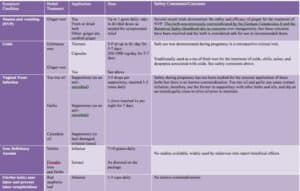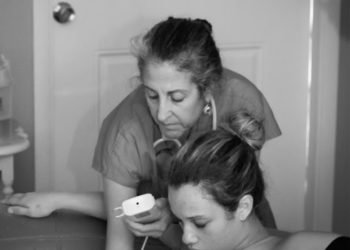The midwives at MidWife360 in West Palm Beach, Florida have gathered our collective knowledge and experience in order to provide you with an introduction to using herbs during pregnancy.
Initial Thoughts on Modern Medicine
As a certified nurse midwife, I’m forever grateful for the medical advancements in obstetric gynecology. Thanks to these technologies, the outcomes of high-risk pregnancies and complications in birth and pregnancy have vastly improved. This has saved countless lives.
There are two sides to every coin, and unfortunately some of these advancements have been, and are continuing to be overused. For example, about 1 in 3 women in the United States gives birth via cesarean delivery. Many experts agree that this is far too high.
Furthermore, the use of pharmaceutical medications for pregnant women is also excessive, and carries risks like cesarean deliver. Many medications that were thought to be safe, like Tylenol and common yeast infection medications, have been found to carry significant risks.
Are Herbs Safe?
In comparison, the usage of herbs during pregnancy appears mild and safe. Just like anything, it’s important to be extra informed and safe when using any herbs or medications during pregnancy. The desire toward more natural and holistic solutions has been growing. At MidWife360 we aim to incorporate more gentle and herbal solutions whenever necessary.
Using herbs for common pregnancy symptoms and discomforts is very commonplace. Using herbs for medicinal purposes dates back to the ancient Egyptians. In all fairness, scientific research and formal evaluations of many herbs are not available or priority.
However, pharmaceutical medications are often in the same boat. In the U.S. almost 90% of all pregnant women will be prescribed some kind of medication during their pregnancy.
As far as herbal and botanical medicine, most of what we know is based on historical, empirical, and observational evidence. There have been some formal and animal studies. Generally, most herbs have no evidence of harm and natural remedies may be safer than typical prescription medications.
Adverse effects are few and far between, and when they do happen it is often because the individual is uninformed. Some herbs can be toxic or are only appropriate in small doses. Keep in mind, many experts have different opinions on the use of herbs. Just because something does not have proven adverse effects, does not mean it is proven to be safe.
Some symptoms or illnesses should always call for prompt medical care, and should not be treated at home with herbs. They are as follows:
- Continuous bleeding
- Initial herpes blisters or outbreak
- Serious pelvic or abdominal pain
- Continuous serious mid-back pain
- Hand and face edema
- Membranes rupture before 37 weeks
- Regular contractions before 37 weeks
- Serious headaches, blurred vision, and epigastric pain
- Fetal movement stopping
Commonly Used Herbs in Pregnancy
There are different lists and opinions among medical professionals. Some of the most common herbs used for pregnancy concerns are: raspberry leaf, evening primrose, garlic, aloe, chamomile, peppermint, ginger, echinacea, St. John’s wort, fennel, wild yam, meadowsweet, pumpkin seeds and ginseng.
Common ailments pregnant women seek complimentary or natural remedies for are anxiety, nausea or vomiting, urinary tract problems, or lower GI problems.
This chart is a helpful tool but always work with your doctor or midwife to be safe. The midwives at MidWife360 are well-versed in the safety and use of herbal remedies.

Herbs for Birth Preparation
Red raspberry leaf tea and red dates are common for birth preparation. Two cups of red raspberry tea daily is safe in pregnancy.
Additionally, studies have shown the tea causes labor to be more comfortable and reduces need for medical interventions. There are even benefits for babies! Newborns are less likely to require resuscitation.
Red dates consumed regularly in the last trimester are safe, and also cause labor to be more comfortable.
The good news is, both the tea and dates are delicious. Making it easy to incorporate into your daily diet and routine. This vegan red raspberry tea latte is a great way to enjoy the tea. Snacking on dates by themselves or adding a few in a smoothie is an easy way to eat them.
Final Thoughts
Herbal remedies can offer significant relief and benefits for some common discomforts and symptoms of pregnancy and childbirth. Just like anything during pregnancy, use herbs with caution and under the supervision of your midwife or doctor.
At MidWife360 in West Palm Beach, Florida we offer herbal recommendations for our patients when needed. Though nothing can replace a healthy diet, exercise, positive mindset, and support system.


















